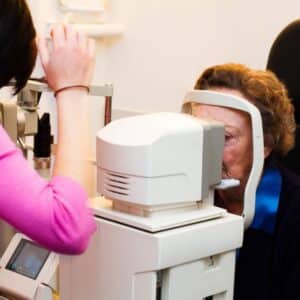What Is Laser Eye Surgery?
Laser eye surgery is a vision correction procedure used to improve visual acuity. During the procedure, a special laser is used to reshape the cornea, which is the clear outer layer of the eye. Reshaping the cornea can help improve vision by correcting refractive errors such as hyperopia, astigmatism, and myopia, hyperopia, and astigmatism. Different types of laser eye surgeries are available, including LASIK, PRK, and LASEK.
The specific type of surgery that is best for a particular patient will depend on their individual needs and the condition of their eyes.
The goal of the surgery is to allow the patient to see clearly without needing eyeglasses or contact lenses.
How Does Laser Eye Surgery Work?
Laser eye surgery uses a laser to remove a small amount of tissue from the cornea, the clear outer layer of the eye. The shape of the cornea is vital because it determines how light rays are focused as they enter the eye. If the cornea is not shaped correctly, it can cause refractive errors such as myopia, hyperopia, and astigmatism.
During laser eye surgery, the surgeon will use a laser to create a precise, thin flap in the cornea. The flap is lifted, and the laser removes a small amount of tissue from the underlying cornea. The flap is then replaced, and the surgery is complete.
Laser eye surgery uses advanced laser technology to reshape the eye’s cornea to improve vision. The procedure is typically completed within minutes, with minimal tissue removed from the cornea. Patients are usually allowed to return to their normal activities soon after the surgery.
Types of Laser Eye Surgery
The different types of laser eye surgery are:
LASIK (Laser-Assisted In Situ Keratomileusis): This is the most common type of laser eye surgery. It involves creating a thin flap in the cornea and using a laser to remove a small amount of tissue from the underlying cornea.
PRK (PhotoRefractive Keratectomy): This type of laser eye surgery does not involve creating a flap in the cornea. Instead, the cornea’s outer layer is removed, and the laser is used to reshape the underlying tissue.
LASEK (Laser-Assisted Sub-Epithelial Keratectomy): This laser eye surgery is similar to PRK but involves removing only a thin layer of the cornea rather than the entire outer layer.
Epi-LASIK: This is a hybrid procedure that combines elements of both LASIK and PRK. It involves creating a thin flap in the cornea and using a laser to reshape the underlying tissue.
SMILE (Small Incision Lenticule Extraction): This is a newer type of laser eye surgery involving creating a small incision in the cornea and using a laser to remove a small lenticular tissue.
The specific type of laser eye surgery that is best for a particular patient will depend on their individual needs and the condition of their eyes. Your ophthalmologist will be able to recommend the most appropriate procedure for you.
What To Expect Before, During, and After Laser Eye Surgery
Before the surgery:
- If you’re interested in laser eye surgery, the first step is a comprehensive eye examination to check if it’s the right option.
- Before undergoing laser eye surgery, you must cease wearing contacts. This is because contact lenses can alter the shape of your cornea, interfering with the expected outcome of the procedure.
- Patients should stop taking medications that may increase their risk of bleeding during the procedure.
During the surgery:
- The surgery is typically performed on an outpatient basis and takes only a few minutes to complete.
- You will be given numbing drops to numb the eye.
- You will be asked to look at a target light, and your eye will be held open with a speculum.
- The surgeon will create a flap in the cornea using a laser or a microkeratome (a blade).
- The laser will be used to reshape the underlying cornea.
- The flap will be replaced, and the surgery will be complete.
After the surgery:
- You will arrange for a friend or family member to drive you home.
- Your eye may feel scratchy or uncomfortable for a few hours after the surgery.
- You will be given eyedrops for a few weeks after the surgery to help prevent infection and reduce inflammation.
- You must avoid rubbing your eyes and participating in contact sports for a specified period after the surgery.
- You will have a follow-up appointment with the surgeon a few days after the surgery to check your healing and vision.
Most people experience a significant improvement in their vision after laser eye surgery. Still, it is common for some visual fluctuations to occur in the first few weeks after the surgery.
In rare cases, additional treatment may be necessary to achieve the desired result. Following your surgeon’s instructions carefully after the surgery is vital to ensure the best possible outcome.
Pros & Cons of Laser Eye Surgery
Pros of laser eye surgery:
- It can improve vision and reduce or eliminate the need for glasses or contact lenses.
- The procedure is quick and painless, taking only around 15 minutes per eye.
- The recovery time is usually short, and most people can return to normal activities the day after the surgery.
- The surgery results are usually long-lasting, although some people may need additional treatments in the future to maintain optimal vision.
Cons of laser eye surgery:
- It is a surgical procedure, and as with any surgery, there are risks, including infection and bleeding.
- It is an option for some patients to help improve their vision, but it is essential to undergo a thorough eye exam before deciding if this procedure is correct for you.
- It can be expensive, and it may not be covered by insurance.
- In rare cases, the surgery can cause complications, such as a reduction in night vision or the development of glare or halos around lights.
- The surgery results may not be perfect, and you may still need to wear contact lenses or eyeglasses to achieve optimal vision.
It’s essential to consider the potential benefits and risks before deciding whether the procedure is correct for you. Make sure to talk to your ophthalmologist in depth about your questions and concerns – only then can you make an informed decision.
Cost of Laser Eye Surgery
The cost of laser eye surgery can vary widely depending on several factors, including the type of surgery, the surgeon’s experience and reputation, and the geographic location of the practice. LASIK is the most expensive laser eye surgery, followed by PRK and LASEK.
According to the American Society of Cataract and Refractive Surgery, the average cost of LASIK in the United States is around $2,000 per eye. However, prices can range from $1,500 to $3,000 per eye. The average cost of PRK is slightly lower, at around $1,500 per eye.
It is important to remember that these prices do not include additional fees for pre-and post-operative care, which can add several hundred dollars to the overall cost of the surgery.
Many laser eye surgery practices offer financing options to help make the procedure more affordable. These options can include monthly payment plans, financing through a medical credit card, or financing through a third-party lender.
It is essential to compare different financing options when considering this surgery, as costs can vary depending on the type of procedure and its location.
You must check with your insurance company to see if they will cover any of the cost of the surgery. Some insurance plans may provide partial coverage for laser eye surgery if it is deemed medically necessary.
Is Laser Eye Surgery Safe?
Laser eye surgery is a safe and effective surgical procedure to correct vision problems such as nearsightedness, farsightedness, and astigmatism.
The procedure has been approved by the FDA since 1995 and is now one of the most commonly performed refractive surgeries in the world. Because of its precision, laser eye surgery could result in improved vision without eyeglasses or contact lenses.
Is Laser Eye Surgery Painful?
Despite the fact that it involves cutting the cornea of the eye, this type of surgery does not typically cause any pain during or after the procedure for most patients. Anesthetic drops are often used during laser eye surgery to reduce discomfort and ensure patient safety and comfort.






